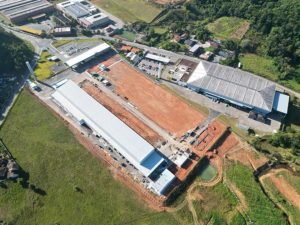HMS Group Announces Financial Highlights for the Six Months Ended June 30, 2014
HMS Group plc announces its consolidated condensed interim financial information, including independent review report by Deloitte Limited for the six months ended June 30, 2014.
Commenting on the financial results in respect of H1 2014, Artem Molchanov, Managing Director (CEO) of HMS Group, stated:
“In the second quarter of 2014 we significantly improved our performance in comparison with the first quarter. However, weak start of 2014 as a result of weak markets and delay of some tenders, targeted by HMS, negatively affected the Group’s half-year results. Our revenue and EBITDA declined and we reported a net loss in the amount of 235 million rubles. Meanwhile, initially, while budgeting 2014, we expected the second half of the year to be substantially stronger than the first one.
We managed to build a solid 30 billion ruble backlog, almost twice larger than a year ago, which secures the Group’s future revenue. Our order intake also grew substantially thanks to a new sizable LH-project [4], which we won in the second quarter of 2014. Though the contract has been already signed, its total amount is still being negotiated. According to our preliminary estimation, it will be about 6 billion rubles.
HMS business is characterized by a high exposure to Russian oil & gas sector. We recognize the risks of possible delays of large tenders in the sector due to economic uncertainties. Postponing of project implementation or reduction of capex of oil & gas majors will indisputably impact HMS’ development.
With key assets located in Russia and Ukraine, HMS Group is not immune to geopolitical risks. To date, our operations and assets in Ukraine haven’t been affected by the tensions in the country. HMS Group is not a subject to the EU and US sanctions. Meanwhile, we are closely monitoring the situation in the region and thoroughly analyzing the related risks in order to implement a contingency plan for the eventuality of its further deterioration.
Though many of the challenges that the global economy and development of oil & gas sector are beyond our control, we believe that strong long-term fundamentals of our business model coupled with the benefits derived from the programmes on asset optimisation, efficiency improvement and cost reduction, will ensure our sustainable profitability in the current market environment and make us to enhance shareholder value”.
Operating Review
As of July 1st, 2014, the Group’s built its record high backlog at Rub 29,763 million, up by 87% year-on-year. This growth was mostly attributable to signed large contracts in the oil & gas business segment, under which only a small portion of revenue was recognized in the reporting period. Excluding these contracts, the backlog grew by 14% year-on-year to Rub 18,151 million. The backlog in the industrial pumps business segment increased by 6% year-on-year to Rub 10,704 million. The backlog of the oil & gas equipment business segment showed an impressive growth due to the abovementioned large contracts. The backlog in the compressors business segment grew by 32% year-on-year in the reporting period. The EPC business segment showed a slight growth in its backlog supported by a number of new contracts signed by the construction subsidiary Tomskgazstroy (TGS) at the end of 2013 and in the beginning of 2014, while the backlog in the project and design sub-segment showed a 34% decline year-on-year due to delay of some targeted projects.
The order intake [5] increased by 41% year-on-year at Rub 18,680 million due to Rub 6 billion large-scale contract in the oil & gas business segment. Excluding this contract, the Group’s order intake remained almost flat year-on-year.
Group Performance
The Group’s revenue for 6 months 2014 decreased by 13% year-on-year to Rub 12,842 million, with revenue from the industrial pumps business segment amounting to Rub 7,574 million or 59% of total Group’s revenue. Meanwhile, EBITDA declined by 21% year-on-year to Rub 1,652 million. As a result, EBITDA margin for 6 months 2014 totaled 12.9%.
The Group’s cost of sales, which traditionally accounts for about 75% of total revenue decreased by 12% year-on-year from Rub 10,968 million to Rub 9,609 million in line with a revenue decline.
Key components of cost of sales – supplies and raw materials combined with cost of goods sold – accounted for 40% and 43% of revenue for 6 months 2014 and 2013 respectively.
Labour costs grew both in absolute numbers and as a percentage of revenue mostly due to acquisition of NIITurbokompressor (NIITK).
Distribution and transportation expenses were down 3% year-on-year and achieved Rub 619 million for 6 months 2014. As a percentage of revenue, they grew from 4% to 5% in comparable periods.
General and administrative expenses totaled Rub 1,939 million, 7% up, for 6 months 2014 reflecting inflation growth. As a percent of revenue, they grew from 12% to 15% year-on-year due to revenue decline.
Other operating expenses declined by 72% year-on-year to Rub 39 million, comprising less than 1% of the Group’s revenue. The key factors are FOREX gain accrued by NEM and lower provisions for legal claims due to their partial recognition as fines in the reporting period.
Depreciation and amortization for 6 months 2014 totaled Rub 724 million, up 20% year-on-year. NIITurbocompressor (NIITK) and Noyabrskneftegazproekt (NNGP), acquired in the second quarter of 2013, attributed to this growth. Growth in depreciation and amortization impacted the Group’s bottom line.
For 6 months 2014, the Group’s operating profit decreased by 71% year-on-year to Rub 636 million. In 1H 2013, the Group recognised Rub 955 million extra gain from the bargain M&A. Excluding this gain, the Group’s operating profit was Rub 1,256 million, 49% higher than in 1H 2014.
Interest expenses decreased by 12% to Rub 642 million compared to Rub 733 million for 6 months last year due to debt level decline and an effective control of interest rate.
The Group reported loss before income tax in the amount of Rub 148 million for 6 months 2014 versus Rub 1.5 billion profit before income tax a year ago.
Despite loss before income tax, the Group had an income tax expense of Rub 88 million in the reporting period. The key sources of the accrued income tax are the following: some expenses which were not deductible for tax purposes as well as intra-group sales of shares in subsidiaries.
The Company recorded a net loss of Rub 235 million for 6 months 2014, compared to a net profit of Rub 1,309 million for 6 months 2013.
Segment Performance
Industrial pumps business segment
The industrial pumps business segment designs, engineers, manufactures and supplies a diverse range of pumps and pump-based integrated solutions to customers in the oil and gas, power generation and water utilities sectors in Russia, the CIS and internationally. The business segment’s principal products include customized pumps and integrated solution as well as pumps built to standard specifications; it also provides aftermarket maintenance and repair services and other support for its products.
The industrial pumps business segment’s revenue declined by 7% year-on-year to Rub 7,574 million for 6 months 2014 from Rub 8,161 million for 6 months 2013, while EBITDA decreased by 11% year-on-year to Rub 1,095 million. EBITDA margin stood at a healthy 15%.
The key factors behind the segment’s margin decline were weaker markets and a decline of orders for some types of high-margin standard pumps for power generation and oil treatment.
Oil & Gas equipment Business Segment
The oil & gas equipment business segment manufactures, installs and commissions modular pumping stations, automated metering equipment, oil, gas and water processing and preparation units and other equipment and systems for use primarily in oil extraction and transportation. The segment’s core products are equipment packages and systems installed inside a self-contained, free-standing structure which can be transported on trailers and delivered to and installed on the customer’s site as a modular but fully integrated part of the customer’s technological process.
Revenue in the oil & gas equipment business declined by 17% year-on-year for 6 months 2014 to Rub 2,944 million, compared to Rub 3,568 million for 6 months 2013. The segment’s EBITDA dropped by 33% year-on-year to Rub 278 million in the reporting period versus Rub 415 million for 6 months 2013.
The segment’s performance in both periods was supported almost exclusively by regular business, servicing small and mid-sized orders for standard equipment. The contribution of the large-scale projects in 1H 2014 was immaterial. Meanwhile, in the reporting period, Neftemash’s production facilities were underloaded due to preparation for the large-scale projects as well as weaker-than-expected markets, which impacted the segment’s results. The Group expects better performance of the segment in future supported by the execution of Rospan and LH-project.
Compressors Business Segment
The compressors business segment designs, engineers, manufactures and supplies a diverse range of compressors and compressor-based solutions, including compressor units and compressor stations, to customers in the oil and gas, metals and mining and other basic industries in Russia. The business segment’s principal products include customized compressors, series-produced compressors built to standard specifications, and compressor-based integrated solutions.
The compressors business segment significantly underperformed in the reporting period: revenue decreased by 55%, while EBITDA turned negative to Rub -166 million. As a result, the segment’s EBITDA margin was negative.
Weak half-year performance of the compressors business segment reflects delay of some targeted tenders (Yurubcheno-Tokhomskoye, Tsarichanskoye and Kapitonovskoye fields) and failure with the tender for the Yurkharov field. In addition to this, a deferred start of Rospan project and reschedule of its second stage for 2015 also impacted the segment’s results.
The Group launched the cost-cutting programme, designed to partially compensate the abovementioned delays, from which the segment is expected to benefit only next year.
Engineering, Procurement and Construction (EPC) Business Segment
The engineering, procurement and construction (EPC) business segment provides design and engineering services, project management and construction works for projects for customers in the oil upstream and midstream, gas upstream and water utilities sectors.
EPC was the only business segment that improved its results in the reporting period in comparison with last year performance: revenue grew by 8% and EBITDA turned positive. EBITDA margin achieved 13%.
The achieved growth was attributable to optimization of TGS’ construction business, which showed positive margin in the reporting period. The results of GTNG were lower-than-expected due to delay in some projects. The Group’s strategic decision to dispose its construction business remains unchanged. The strategy for Project & Design sub-segment is focused on operating efficiency and higher exposure to gas upstream development projects.
Financial Review
Cash Flows Performance
Operating cash outflow as of June 30, 2014 reduced to Rub 479 million as a result of working capital decrease.
Working capital decreased by 36% year-on-year to Rub 5,526 million and comprised 18% of total revenue taken for the last 12 months (LTM) versus 25% for the previous period [6]. The key factors beyond the working capital decline were advances on Rospan and LH-project, final payments under the large-scale projects and SKMN disposal.
The outflow from investing activities decreased from Rub 1,664 million to Rub 450 million due to the absence of M&A deals. The main part of the outflow from investing activities in 1H 2013 was attributable to the intergroup loan to SKMN and the acquisition of NIITK. Capital expenditures were in line with the Group’s expectations and amounted to Rub 535 million.
Free cash flow was negative at Rub -928 million for 6 months 2014.
Debit and Liquidity Position
For 6 months 2014, the Group’s total debt decreased by 17% year-on-year to Rub 14,454 million compared to Rub 17,319 million in the previous period. 70% of the total debt was represented by long-term facilities. Debt reduction was a result of managerial efforts on working capital optimisation.
Net debt decreased to Rub 12,276 million, while net debt-to-EBITDA taken for the last 12 months (LTM) ratio stayed at 2.6x, the same level as last year and within banks covenants.
As of September 1st, 2014, an average interest rate was 10.1% for all loans, including FX-denominated, and 10.7% for Rub-denominated ones.
Solid liquidity position as of September 29th, 2014 with Rub 1.2 billion in cash combined with committed unused credit lines of Rub 1.3 billion with maturity more than 12 months covered HMS’s short-term debt.
Recent Development
During 6 months 2014, the Group signed the contract to deliver complex equipment for processing of liquid hydrocarbons for large oil-gas-and-condensate fields in Siberia (LH-project). The scope of contract includes manufacturing and delivery of complex technological facility, including block-modular process pump stations, block-modular head pump stations, block-modular main pump stations, block-modular retaining pump stations, buildings of oil system and other components of the major process equipment. Total amount of the contract is not final and being negotiated. Total budgeted revenue for this contract as of 30 June 2014 is about Rub 6 billion. The contract is expected to be executed during 2014-2015.
In August 2014, Kazankompressormash (KKM) and Kazan Motor-Building Production Association (KMPO), the largest developer and producer of gas-turbine and gas-pumping units (GPU) in Russia, signed a strategic agreement on development and production of equipment for GPUs and compressor stations. The partners agreed on collaboration and sharing of experience in joint projects to better address the customers’ requirements.
Since the beginning of 2014, the Group has signed several contracts with Russian and international oil & gas majors on supply of water injection pumps, booster pumps, upstream process equipment and a contract on provision of short-term repair services, refurbishment and supply of pumps and auxiliary equipment to Iraq. Total amount of the contracts is about Rub 1 billion.
Financial Management
In September 2014, HMS Group made a partial redemption of its Ruble bonds for Rub 900 million excluding accumulated coupon interest. The company purchased 900,000 bonds at 100% par value. Bonds buy-back was financed by an unsecured non-revolving credit line up to 3 years, lent by Raiffeisenbank at the end of this August. The bank also acted as a purchase agent.
In April-June 2014, HMS Group obtained two unsecured 3-year credits from Raiffeisenbank (Rub 981mn) and UniCredit Bank (Rub 750mn), which were utilized for refinancing of the Group’s current bank indebtedness.
Principal Risks and Opportunities
HMS Group may be exposed to various political, economic and other risks in its countries of operations (Russia, Ukraine and Belarus). One of the Group’s subsidiaries, Nasosenergomash (NEM), is located in Sumy, Ukraine. Pumps produced by NEM are primarily sold to Russian customers. For 6 months 2014 and for the year 2013, its revenue approximated 13% of the Group’s consolidated revenue. To date, political environment in Ukraine hasn’t directly impacted operating activities of NEM. Meanwhile, the Group’s management believes, that certain customers may take a conservative and cautious position, when considering the purchase of products made in Ukraine. However, opportunities to change a supplier are limited, as major competitors of NEM are located in the US and Western Europe. Due to these risks, as well as high-level capacity utilisation of NEM, the Group has speeded up the previously developed project aimed at building up the respective competencies within its Russian subsidiaries.
Regular business between Russia and Ukraine is currently under threat. The Group’s management doesn’t exclude the worst scenario of the development of Ukrainian crisis, which may result in the full termination of goods delivery from Ukraine to Russia.
Since March 2014, the US and EU have imposed sanctions on certain Russian sectors, officials and companies. Sectoral sanctions are authorized, among others, on the energy sector with particular target of the oil exploration and production for deepwater, Arctic offshore and shale projects. Certain Russian oil companies are subjects to capital markets restrictions. HMS Group, not being directly affected by these sanctions, is exposed to associated risks. The Group’s management identifies potential risks of reduction of CAPEX programmes by Russian oil & gas companies, which can affect the Group’s performance due to its large exposure to Russian oil & gas sector.
The US and EU sanctions, imposed on Russian energy sector are limited to the oil exploration and production for deepwater, Arctic offshore and shale projects. The Group’s management believes that such situation could catalyze the development of traditional oil & gas projects and as a result the Group may benefit from this situation, as most of its products are used for that type of projects.
Russia may increase import duties for oil & gas equipment to stimulate domestic production. Certain customers have taken a conservative and cautious position when considering the purchase of products made by foreign manufacturers. The Group may benefit from a lower competition with foreign pump producers. Moreover, HMS is already a partner of choice for many Russian oil & gas majors.
Gazprom’s “Eastern gas programme” is the key project in Russian gas sector targeting the establishment of a new gas export center in Eastern Russia to supply pipeline gas from Russia to the Asian-Pacific region. The Group may benefit from delivery of its compressor equipment for adjacent pipelines to the GTS “The Power of Siberia” and participation in the development of the Chayandinskoye deposit.
Source: HMS Group





